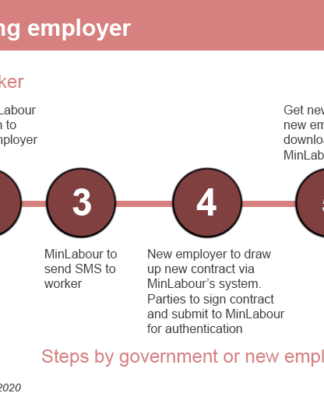Online gig work is growing rapidly, but workers lack job protections: report
Stock image
By AP
Published on 07/09/2023 – 16:37•Updated 16:38
Share this article
Comments
Estimates put the number of global online gig workers at as many as 435 million people and say demand for gig work increased 41% between 2016 and the first quarter of 2023.
Online gig work is growing globally, particularly in the developing world, creating an important source of employment for women and young people in poorer countries where jobs are scarce, according to a World Bank report.
The report, released on Thursday, estimates the number of global online gig workers at as many as 435 million people and says demand for gig work increased 41% between 2016 and the first quarter of 2023.
However the boost is generating concern among workers’ rights advocates about the lack of strong job protections in the gig economy, where people work job to job with little security and few employment rights.
While location-based gig services such as Uber, Lyft and TaskRabbit require labour like moving and delivery, online gig assignments can be largely done at home. Tasks include image tagging, data entry, website design and software development.
An opportunity for women and youth
For women in the developing world, “there aren’t enough opportunities and they really struggle to get good quality jobs because of constraints and household responsibilities,” said Namita Datta, lead author of the World Bank report.
She said online gig work provides women and underprivileged youth “a very interesting opportunity to participate in the labour market.” Roughly 90% of low-income countries’ workforce is in the informal sector — jobs that aren’t taxed or monitored by the government — according to the report.
Worker advocates stress the precariousness of gig work and the lack of job security, accountability from management and other social protections to workers’ health and retirement.
“The economic conditions in developing countries are different from the US, but one thing that is universal is the importance of developing and prioritising good jobs — with a basic minimum wage and basic labour standards,” said Sharon Block, executive director of Harvard Law School’s Center for Labor and a Just Economy. ”There might be different pathways and timelines of getting there, but that’s a universal value.”
Remote Working: Bridging the gap between the worker-employer divide
The hidden factors plaguing teleworking: Why are remote workers feeling the burn?
Eurozone GDP sees barely any growth in second quarter
The report outlines how social insurance coverage is low among gig workers globally. Roughly half of the surveyed gig workers did not have a retirement plan and as much as 73% of Venezuelan gig workers and 75% of Nigerians did not have any savings for retirement.
Lindsey Cameron, a management professor at the Wharton School of the University of Pennsylvania, said “because there are so few options available to workers in these developing nations,” online gigs — with or without social protections — were better than no job options for many workers.
“And since workers are economically dependent on this work, and they don’t have any sort of basic protections, that’s what is ultimately exploitive. The odds are always in the platform’s favour, never the workers’ favour.”
Gig work on the rise in the US
In the United States, gig workers, both online and onsite, represent a growing portion of the workforce and there is ongoing contention about worker rights on these platforms.
A 2021 Pew Research study, the latest available, shows that 16% of US adults have earned money through an online gig platform, and 30% of 18- to 29-year-olds have done so.
Transportation and delivery companies Uber, Lyft, and Grubhub have been entangled in dozens of lawsuits over minimum wage, employment classification and alleged sexual harassment.
“Right now, there are too many jobs where workers are misclassified,” Block said. “Which means many workers are not guaranteed minimum wage, do not have a social safety net, they don’t get unemployment, or workers compensation.”
“Now some states have stepped in to mandate paid leave, but if you don’t live in one of those states, you have to play the good boss lottery.”
The World Bank report was based on surveys across 17 countries, including Egypt, Argentina, Nigeria, Russia and China.






























